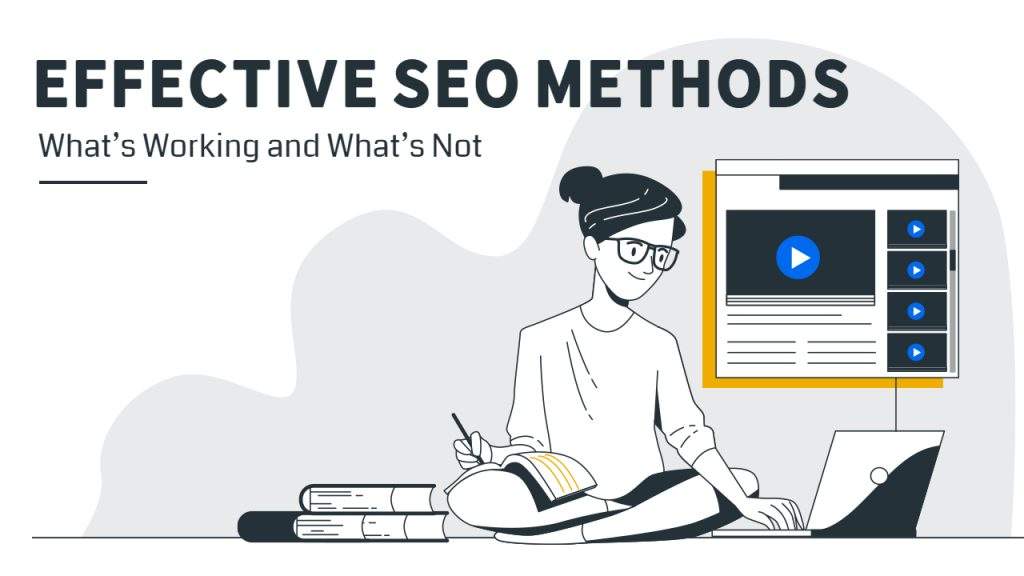
Effective SEO Methods – What’s Working and What’s Not
The rules of SEO (search engine optimization) are rewritten continuously to the point that is just tracking Google’s 800-plus algorithm updates each year is practically a full-time job. It’s no exaggeration that the techniques that worked so well last week may not work at all next week.
To help keep you out of the search engine penalty box, here’s a rundown of the tried and tested search ranking techniques that continue to work today, as well as a recap of “yesterday’s” methods that you need to drop from your SEO task checklist as quickly as possible.
Which Method Is Working
Double Check All Webpage Content for Maximum Reader Value.
It’s not enough to run your content through a spelling and grammar checker (you are using a spelling and grammar checker, aren’t you?) and declare your article “good enough.” Your content needs to positively scream VALUE if you hope to attract prospective customers and win any ranking love from Google.
High-value content answers questions and offers solutions to problems confronting your readers. If you are serving the local clients then it is the best guide to know. And know about landing a local client is the best option.
Ideally, your content will offer a fresh look not easily found elsewhere. Be sure to update periodically, refresh your content with a rewrite, and replace your older content with new material. Modernize your “old school” all-text content with graphics or short videos.
Focus on Backlink Quality, Not Quantity
One of the best indicators to Google of your site’s authority is the third-party websites that backlink to your site. Steer clear of those worthless “1,000 backlinks for $10” packages that are still being sold to uneducated webmasters – they simply don’t work anymore.
To get past Google’s updated SEO ranking algorithm, backlinks now have to come from authoritative sites related to your niche. What’s more, those backlinks have to appear to be occurring randomly and naturally. Anything less will eventually earn your website a seat in the penalty box.
Encourage Social Sharing
While Google has never acknowledged social signals as a ranking factor, content shared on social media networks will frequently get indexed by the search engines. Shared content also helps boost your viewing audience base and increase your fan following.
Include social sharing buttons on your site and each blog post for the most popular social media networks such as Facebook, Twitter, and LinkedIn. Don’t be bashful about asking readers to “like” and “share” your content.
Outbound and Internal Linking
Internal and outbound links add valuable “link juice” to your site in much the same manner as inbound links.
Outbound links to relevant authority sites help improve your site’s relevancy in search engines’ eyes. Be sure to only link out to relevant sites with reader-useful content.
Similarly, your internal links should direct readers to related content on your site. This will increase visitor time on your website as well as help Google better understand the structure and focus of your web pages.
Which Method Is Not Working
Keyword Stuffing
Back in the day, webpages used to be so mindlessly stuffed with keywords reading the actual content were next to impossible. No more. Repetitive keyword stuffing these days will get your site penalized by the search engines as well as alienate your readers, who will likely abandon your site in favour of more useful content elsewhere.
Keywords are still important – just don’t overdo it. Once in the title, once in the description, and no more than twice in the article itself is plenty.
Buying Backlinks
Buying links from link brokers or private blog networks are frowned on by Google and will earn your site a penalty rather than improved rankings. Even if the linking site has decent authority metrics, avoid it because Google looks at paid links as an unnatural practice. Think of a good backlink as “editorially earned” based on the quality of your content, and you’ll be golden.
You may also like a blog about why should i buy backlinks.
Spammy Guest Commenting
Once upon a time, it was okay to add a fluffy no-value-added comment on a blog just to get a cheap link to your website. Many webmasters even posted on hundreds of sites totally unrelated to their niche and got away with it. At least for a while.
Today, the search engines devalue excessive low-value guest commenting done solely for the purpose of gaming the search rankings. Guest commenting still has value when it’s done judiciously on quality sites related to your niche. Make sure that your comments relate to the blog topic and add value to the conversation.
Over-optimized Anchor Text
Once an accepted practice, excessive use of the exact keywords you’re trying to rank for as your linking anchor text is no longer allowed because it’s considered “unnatural.” You want to mix up your anchor text, making it appear as diverse and “natural” as possible. Instead of relying so much on keywords for your anchor text, use your brand name, a generic anchor such as “click here,” or the URL of the material being linked to.

















